Key takeaways:
- Acting exercises are fundamental for developing essential skills like voice control, emotional expression, and character understanding.
- Different types of exercises, including warm-ups, improvisation, and character-based activities, enhance a performer’s creativity and adaptability.
- Creating a supportive practice environment and seeking feedback can significantly improve an actor’s growth and performance quality.
- Consistent practice and engaging with diverse genres can expand an actor’s range and deepen emotional connection to their roles.
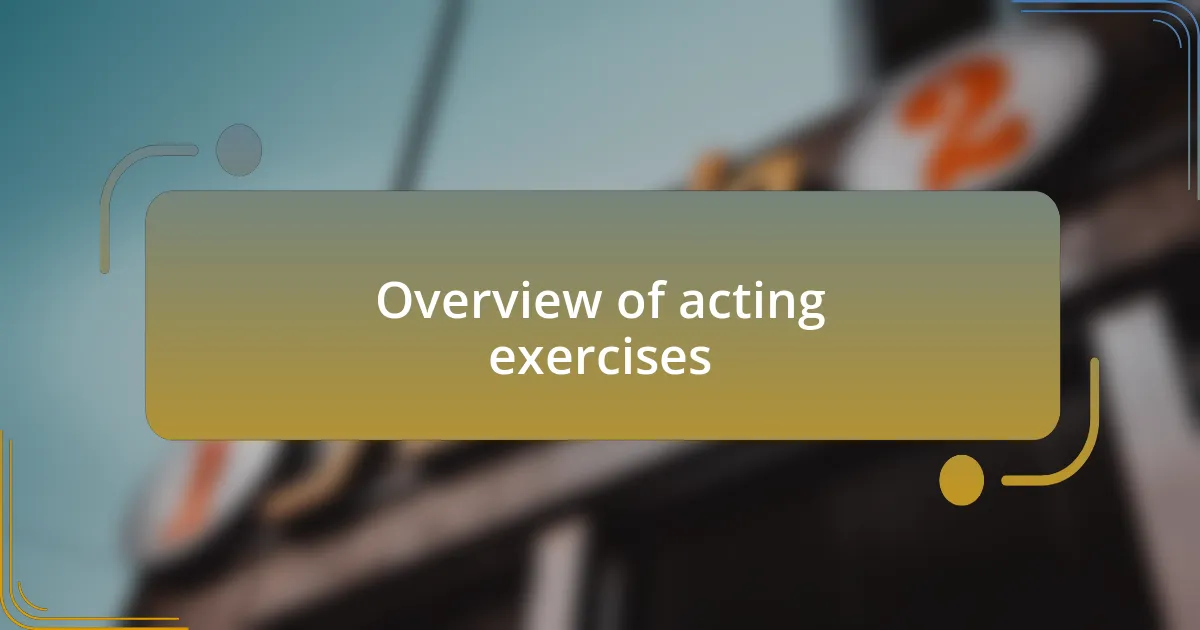
Overview of acting exercises
Acting exercises serve as the backbone of an actor’s training, refining skills like voice control, emotional expression, and character development. I remember my first day of drama class; we dove straight into improvisation games that not only broke the ice but also ignited my passion for storytelling. Isn’t it fascinating how something as simple as a warm-up exercise can transform your ability to connect with an audience?
Structured acting exercises can range from basic vocal warm-ups to complex scene studies, each designed to target specific skills. For instance, I often revisit physical movement exercises that push me out of my comfort zone, forcing me to embody different characters. Have you ever considered how your physicality influences your performance? Engaging with these aspects can often reveal layers of a character that you didn’t even know existed.
These exercises aren’t just about technique; they’re also about forging deeper emotional connections. During a particularly challenging scene, I found solace in using emotional recall exercises, where I tapped into my own experiences to enrich my portrayal. Have you tried immersing yourself in your personal memories to evoke genuine emotions? It’s a powerful method, reminding us that every actor’s journey is both unique and universal.
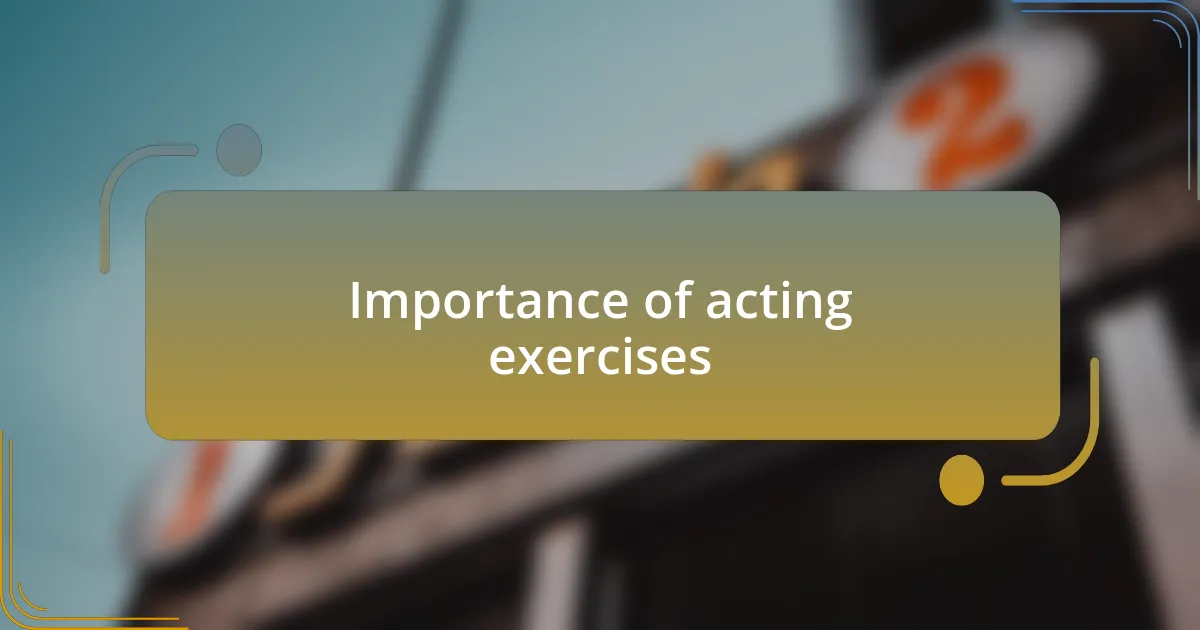
Importance of acting exercises
Acting exercises are essential for developing a range of skills that are crucial for any performer. I recall a time when I struggled to project my voice during auditions. It was only after committing to daily vocal drills that I discovered the power of breath control and resonance, transforming my ability to command a stage. Have you noticed how a confident voice can draw an audience in?
Beyond just honing technical skills, acting exercises foster a deeper connection to the character. I once participated in a character analysis workshop where we delved into our characters’ backstories, motivations, and flaws. It was astounding how these insights illuminated my performance, making it richer and more relatable. Have you had moments where understanding your character’s journey changed how you portrayed them?
Moreover, engaging in these exercises cultivates resilience and adaptability, which are critical in the unpredictable world of acting. There have been instances where I had to think on my feet during live performances, and the improvisational skills I developed through targeted exercises saved me. Isn’t it intriguing how our practice not only prepares us for the spotlight but also equips us to handle unexpected challenges with grace?
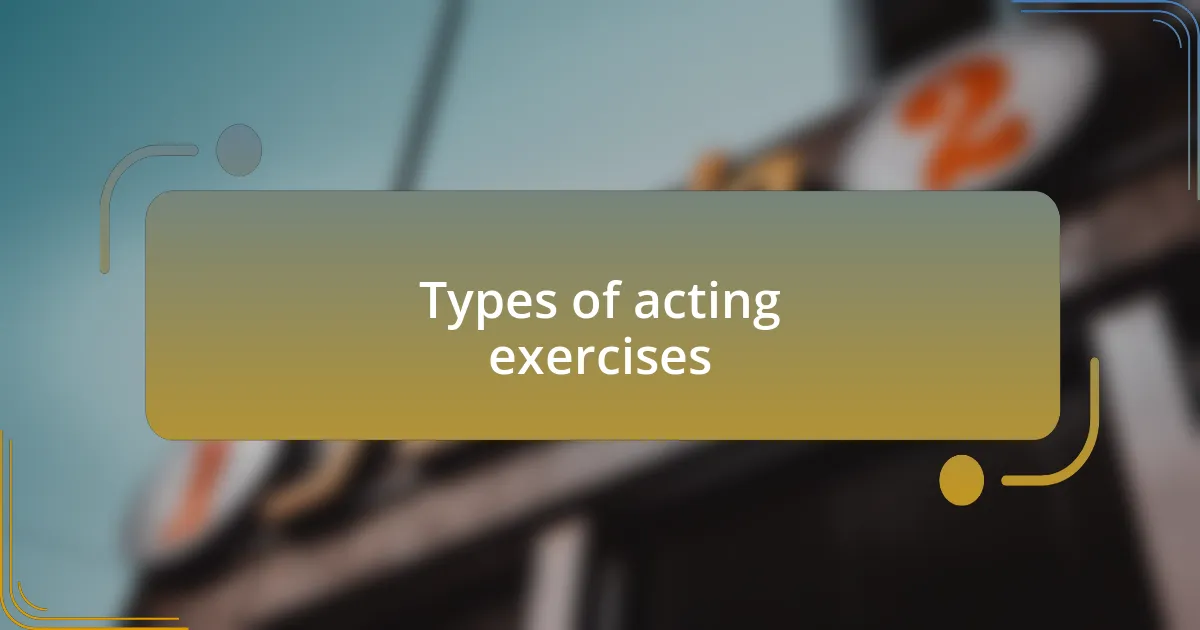
Types of acting exercises
Acting exercises can be categorized into several types, each serving a unique purpose. For instance, warm-up exercises focus on physical and vocal readiness, helping performers shake off nerves before auditions. I remember one unforgettable warm-up session where I felt silly at first, but the body stretches and vocalizations energized me, transforming my mindset from anxious to empowered. Have you ever noticed how a simple warm-up can completely shift your state of mind?
Improvisational exercises are another essential type, promoting creativity and quick thinking. I vividly recall an improv workshop where we had to create a scene on the spot based on a random word. It was both thrilling and terrifying, but I learned to trust my instincts and collaborate with others fluidly. Does this kind of spontaneous acting excite you as much as it does for me?
Lastly, character-based exercises delve deep into the psychology of a role. I once engaged in an intense session where we lived as our characters for a day, adopting their mannerisms and thought processes. The experience deepened my understanding and empathy for the character, allowing me to bring authenticity to my scenes. Have you ever fully immersed yourself in a character, only to discover parts of yourself you didn’t know were there?
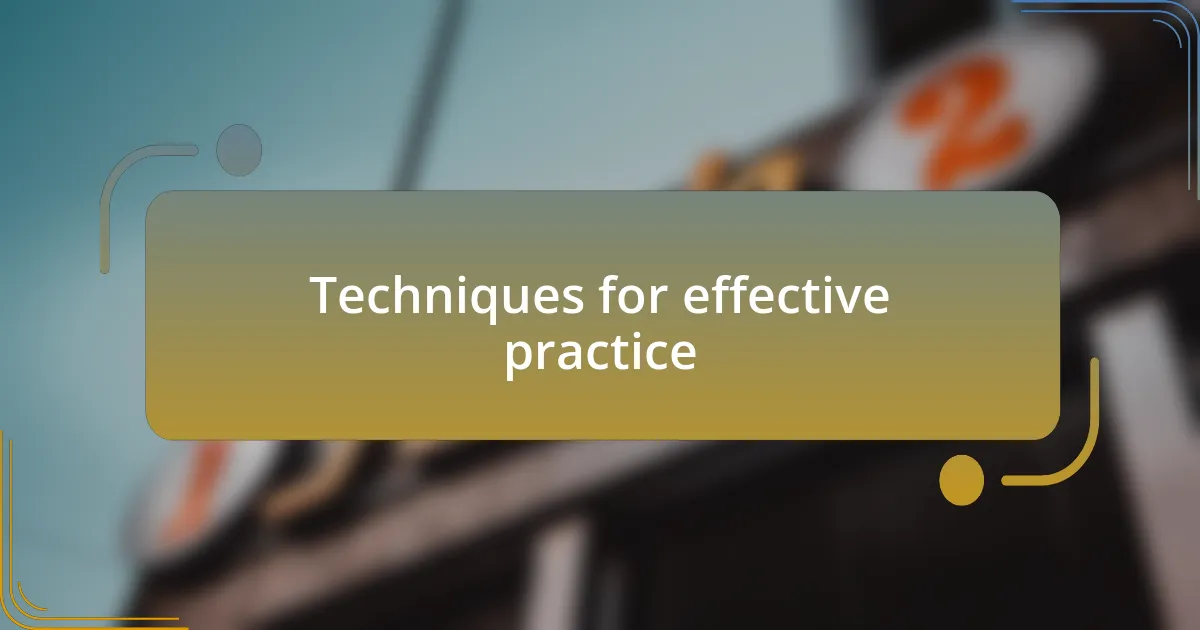
Techniques for effective practice
Practicing acting techniques effectively requires a blend of focus and flexibility. One technique I’ve found invaluable is setting specific goals for each practice session. For example, I remember the time I focused solely on emotional range; by rehearsing different scenes with varying emotional weights, I learned to tap into feelings that surprised me. Have you ever set a small target and felt a thrill when you hit it?
Creating a safe and supportive environment is crucial for effective practice. During my early acting days, I joined a small group where we shared our work without judgment. This space transformed my performances, allowing me to explore vulnerabilities and experiment with bold choices. Have you had a similar experience where being surrounded by the right people inspired you to push your limits?
Lastly, embracing feedback enhances growth in practice. I once participated in a feedback circle after a performance, where we exchanged insights openly. At first, I was apprehensive, but the constructive criticism helped me refine my skills and see my work through others’ eyes. Isn’t it fascinating how external perspectives can unlock new dimensions of our artistry?

My personal favorite exercises
One of my personal favorite exercises is improvisation with random prompts. I remember a particularly hilarious session where we were given strange objects—like a rubber chicken or a kitchen timer—and had to create a character on the spot. It pushed me out of my comfort zone and really forced me to think on my feet. Have you ever let go of your inhibitions and found yourself surprised by what you could create?
Another exercise I love is the “Emotion Wheel,” where I pick a specific emotion—like joy, sadness, or anger—then try to embody and express it in various scenarios. I recall an instance where I chose fear and ended up diving deep into a monologue that revealed layers I hadn’t tapped into before. It was a revelation! Doesn’t it feel exhilarating to uncover those hidden depths within your own performance?
Lastly, I often engage in mirror work, where I practice my lines while observing my expressions and body language. This method has been both revealing and challenging. I distinctly remember one evening when I realized my nervous habit of adjusting my hair during intense scenes. Recognizing this helped me focus more on genuine emotion rather than distractions. Have you ever discovered something in your performance that shifted your entire approach?
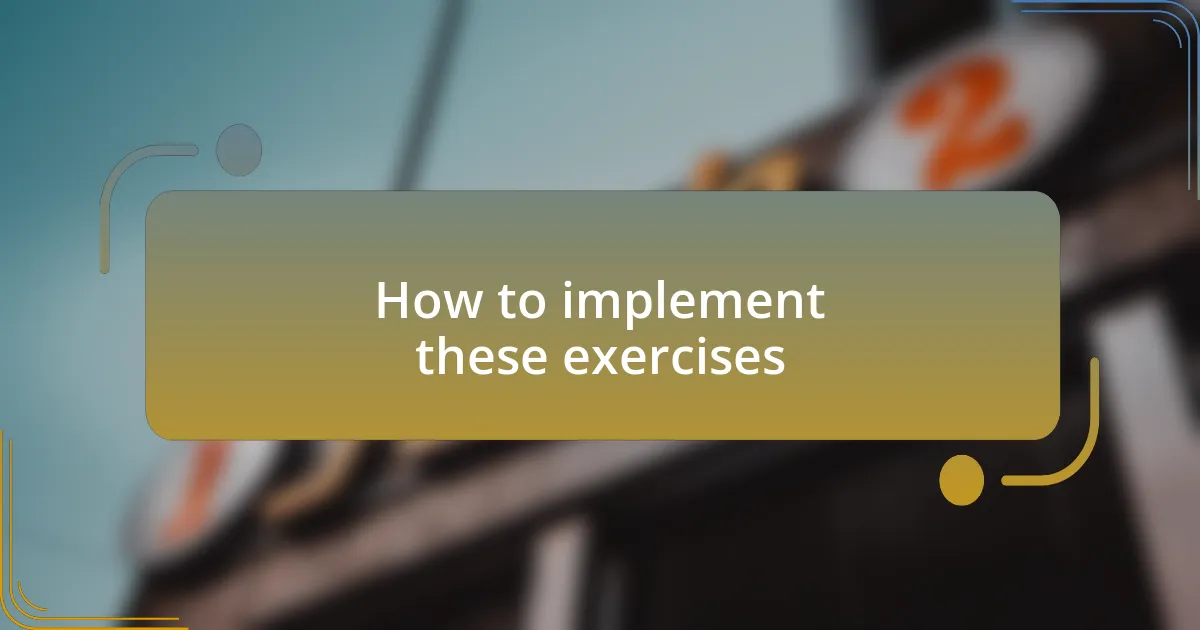
How to implement these exercises
When implementing these exercises, setting up a dedicated space for practice can make a significant difference. I remember transforming my living room into a mini stage, laying out props, and encouraging friends to join. It’s amazing how creating that environment boosted my creativity and made the exercises feel more impactful. Have you ever noticed how a change of scenery can inspire a fresh perspective?
Another key aspect is consistency. I developed a routine where I dedicated at least 30 minutes each day to practice improvisation or emotion work. Over time, I saw real growth—my confidence soared, and my ability to connect with characters deepened. How do you think a set schedule could enhance your acting skills?
Lastly, don’t underestimate the power of feedback. After each session, I would ask trusted peers to share their observations about my performances. That exchange opened my eyes to aspects I hadn’t even considered, helping me refine my craft further. Have you ever sought outside perspectives that completely changed how you view your acting?
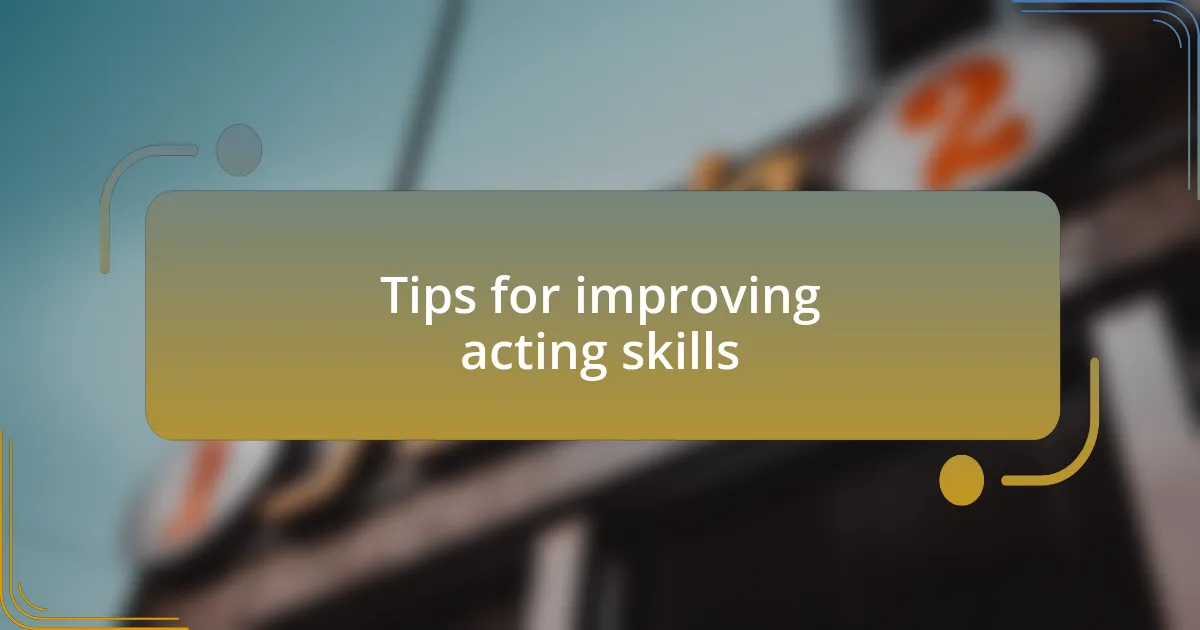
Tips for improving acting skills
Improving your acting skills is often about pushing boundaries and stepping outside your comfort zone. I vividly recall a workshop I attended where we explored different characters through physicality. Trying to embody a completely different persona—not just in speech but in movement—was exhilarating. Have you ever felt how changing your physical approach can unlock new emotional depths?
Another effective tip is to incorporate script analysis into your practice. I once spent hours dissecting a short scene, focusing on subtext and character motivations. This deep dive revealed layers I initially missed, and it transformed how I approached monologues later on. Have you considered how understanding the nuances of a script can elevate your performances?
Finally, I highly recommend exploring diverse genres and styles. During my earlier days, I ventured into both dramatic scenes and comedic sketches. The contrast challenged my adaptability and taught me invaluable lessons about timing and emotional truth. How might experimenting with a different genre expand your acting range?